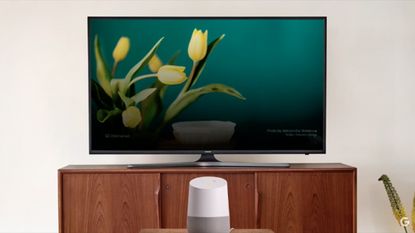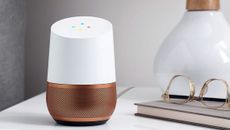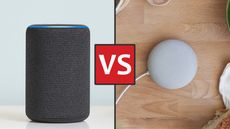Google Home is a voice-controlled miracle of modern technology.
You can ask it questions and it will respond. You can have it play music. You can access news headlines and your own calendar. You can use it as a very expensive kitchen timer and clock. It is your digital, personal assistant, leveraging the power of the cloud and its maker's knowledge.
It's also worth noting that Google is likely to slash prices on the Google Home in the Black Friday sales.
- Hang on, didn't someone do this already? Read our Amazon Echo review
- And didn't they also do the same thing but way cheaper? Read our Amazon Echo Dot review
Yes, Google Home is undeniably a very similar product to Amazon Echo, with its 'Alexa' voice assistant.
In my opinion, the two are in fact almost indistinguishable in terms of core functionality and performance. However, Echo clearly does far more at the moment – although I am fairly sure that'll change over the next 12 months.
That means that the short version of this review is this: if you really want a music-playin', kitchen-timin', weather-tellin', Spotify-compatible artificial intelligence in your home right now, get Amazon Echo.
Unless, that is, you are already deeply invested in Google's eco-system of Google Music and Chromecast, and also use Netflix. Although even then, you're probably better off with Alexa (or perhaps not bothering for the time being, while early adopters wrestle with both devices' quirks).
Google Home: what does it do?

If you're playing catch-up here, and have no idea who Alexa is or what a home AI might do, here's the potted version.
Google Home is a listening, talking device that can understand your words and respond to a decent range of orders, questions and requests. It's always 'hearing', unless you specifically mute its mic, but it's not actually 'listening' until you say 'Hey, Google' or 'Okay, Google'.
It's broadly similar to Siri on iOS or Google Assistant on Android, but built into a speaker that lives in your gracious abode. This means it's better at listening, as it's always out in the open, and has a plethora of mics built in.
It's also louder at responding, and works better as a music speaker than your mobile.
Core functions are music playback (with support for YouTube Music, Spotify and various radio apps), a headline view of news, sport and weather (the likes of The Guardian, Telegraph and Sky are included), and acting as a kitchen timer and clock.
Google Home will also tell you your diary appointments, once you've synced it with your Google Calendar, use Google search to answer all manner of trivia questions, play Netflix movies via Google Chromecast and control a growing range of smart home products, including Philips Hue bulbs and Nest thermostats.
Google Home: setup
Setup is so easy. Download the Home app, turn your device on, follow the instructions and Google Home will be hooked into your Wi-Fi, Google account and the likes of Netflix and Spotify, in no time.
There's no need to teach Google Home what your voice sounds like, it just picks it up right away. Well, it did with my posh tones anyway, and supposedly it works from Cornwall to the Hebrides, accent-wise.
Account setup is done via the app rather than by having to spell out your logins and passwords. I didn't really encounter any glitches along the way.
Now admittedly, part of the reason setup is so quick and simple is because Google Home doesn't do an awful lot at present.
With Amazon Echo, once the basics are done, you can then move on to adding any of a huge range of different 'actions' (apps, essentially), adding voice control to everything from summoning an Uber to ordering a takeaway.
Google Home: design
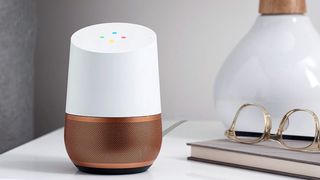
Hey, it's a good-looking thing.
With a range of eight colour bases, Google Home is arguably better looking than Amazon Echo. Possibly it's slightly more 'feminine' looking, if you like to characterise things that way.
You can make your own mind up on the aesthetics, but I'd say Google's offering is a sexier beast than Amazon's market leader. The way coloured lights appear on its top surface is also more pleasing than Echo's more aggressive, whirling ring of neon.
On the other hand, the smaller Amazon Echo Dot is way more discreet than Google Home. And the Google Home Mini might be the best-looking of the lot.
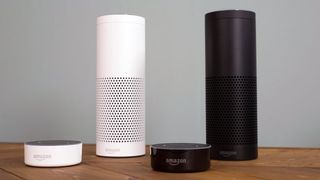
Google Home: performance
In many ways, Google Home is remarkably futuristic, and a work of genius.
So I feel like I'm being horribly jaded when I say that, after living with Amazon Echo for the last three months, I found Home quite boring. Because it's essentially the same product, but with a Google back-end rather than an Amazon one.
It accurately hears and responds to voice commands most of the time – just like Alexa – plays all the music in the world from Spotify or its own-brand music store – just like Alexa – and is an absolutely kick-ass kitchen timer – just like Alexa.
Also like Alexa, it sometimes mis-hears you – but not so often that you end up throwing it out of the window – and often hears you just fine, but says it's terribly sorry but it can't help you with that.
Ask for the weather and it will let you know it's going to be sunny. But ask it what the pollen count is going to be, and you get "I'm sorry, I can't answer that yet."
Home always says, "I can't do that yet" in these circumstances. Whether that turns out to be because it will do in due course, or whether it's just a highly annoying affectation, I don't know. Yet.
There's been much made of Home's ability to respond to a string of requests 'contextually' without the need to use the trigger phrase each time, but I have yet to find an actual application for that.
Google Home: music and movies
Home has one clear advantage over Alexa, which is that it can use Chromecast to send music to compatible speakers.
That is perhaps just as well, because as a music speaker it is nowhere near as good as Echo. And it's not like I thought Echo was particularly amazing in that regard.
YouTube Music, in my opinion, is not as good as Amazon Music Unlimited. Amazon's service is also dirt cheap if you only want to use it on your Echo, although pricing beyond that is otherwise similar.
I find that Amazon is better at picking songs I like based on previous music played, better at choosing 'the best' tracks by any given artist, better at differentiating genres, better at lyric searches and in general, just better.
That is not to say YouTube Music is bad, and Spotify is also supported, which of course should be just fine for many users.
Unlike the Echo, Google Home also lets you ask for films and TV shows from Netlfix and then play them via a Chromecast dongle shoved in your telly's HDMI hole.
Now, whether that is better than Amazon's rival is moot, because voice search is supported via Alexa on its Fire TV streamers (though not via an Echo).
Since by definition your TV has to be turned on, with a compatible streamer plugged into it, and tuned to the right channel for this to work, I am not sure that is a big advantage for Home.
Like a lot of Home AI functions, this is slightly clunky at present, as well. I asked it to play Rupaul's Drag Race and even though I'd watched the first episode of the current series on Netflix the previous week, it played not episode 2 but rather the first episode from a series so long ago, Rupaul actually looked somewhat feminine.
There's also support for iPlayer, BT Sport and others, via their respective apps, but I haven't had time to test those yet.
Google Home: smart home control
This is another key area for AI butlers, and it's another one that Home performs with aplomb, but not quite as well as Echo.
Adding new products for voice control is again incredibly easy, but the range is rather smaller than what Alexa can handle, and grouping products by room is also a touch clunkier.
If it's control of lighting via Hue and temperature via Nest that you want, Home delivers. And to be fair, that is probably going to be sufficient for a big chunk of users.
Hive and Honeywell products are supported, and you can turn Belkin and TP-Link devices on and off, as well as use SmartThings and a few other ranges that are less well known in the UK.
I am 110% sure smart home control will catch up with Amazon Echo's pretty rapidly, but for now, it's lagging behind.
Google Home: verdict
Google Home is a near-magical device in terms of its technical abilities, but also one that doesn't do enough to make buying it essential.
And if Amazon's Echo didn't already exist, I'd leave it at that.
Since Alexa and Echo do exist, however, I'll add that for any users who aren't knee-deep in Google's music/Chromecast eco system, I'd currently recommend Amazon's AI instead, particularly the dirt cheap Amazon Echo Dot, as long as you have a speaker to plug it into.
Because of the way Home can access Google Search it's better than Echo at answering questions, but curiously, not by as big a margin as you'd expect. In most other ways, the devices are indistinguishable, or Alexa is slightly better, and Amazon's device also has a far wider range of third-party apps (sorry, "skills").
However, if you check back on this review around the end of 2017, that situation may be very different. The war of the home AIs is only just getting started.
